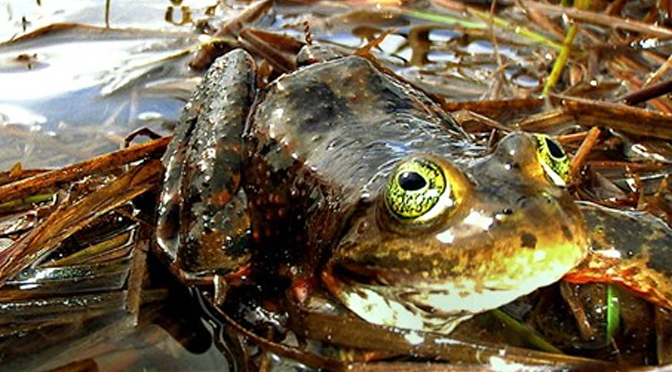(Photo courtesy of Deschutes Basin Board of Control)
Environmental groups’ requests to set trial date and to stay issuance of the formal opinion also denied.
Federal Judge Ann Aiken has ordered the Center for Biological Diversity, WaterWatch of Oregon, five Central Oregon Irrigation Districts, and the U.S. Bureau of Reclamation to meet to resolve their dispute over the Oregon spotted frog.
The order for a settlement meeting came Thursday, as Judge Aiken issued a written opinion denying a preliminary injunction motion filed by the Center for Biological Diversity and WaterWatch of Oregon. In the injunction the Center for Biological Diversity and WaterWatch asked the court to order an immediate change to the operation of Crane Prairie, Wickiup, and Crescent Lake reservoirs, severely limiting if not eliminating the availability of water stored in the reservoirs for the 2016 irrigation season.
Judge Aiken also denied the Center for Biological Diversity and WaterWatch’s March 23 request to stay issuance of a written opinion, which had asked the Court not to issue a written opinion explaining the basis for denying the preliminary injunction, as well as the two groups’ request for the Court to set a trial date for as early as November 2016.
The Court did not dismiss the underlying lawsuits filed by the Center for Biological Diversity and WaterWatch. In those lawsuits, the Center for Biological Diversity and WaterWatch claim the operation of the reservoirs by Central Oregon, North Unit, and Tumalo irrigation districts and the U.S. Bureau of Reclamation (“USBOR”) is violating the Endangered Species Act (“ESA”) and results in harm to the Oregon spotted frog.
“We are pleased with the Judge’s opinion and look forward to continuing our work managing the region’s water in a way that benefits the frog, other fish and wildlife, our water resources, and our local economy,” said Mike Britton, president of the Deschutes Basin Board of Control, which represents eight irrigation districts in Oregon’s Deschutes Basin. Britton continued, “The Districts are investing millions of dollars on projects resulting in conserved water, increased instream flows and enhanced water management, benefitting fish and wildlife species, including the Oregon spotted frog. We all want what is best for the Deschutes Basin but we have to work together.”
The parties have been directed to schedule settlement proceedings with Magistrate Judge Coffin.
About Deschutes Basin Board of Control
The Deschutes Basin Board of Control represents eight irrigation districts in Oregon’s Deschutes Basin. The districts supply water throughout the Deschutes Basin to 8,700 patrons across 155,662 acres. The districts are working in partnership with conservation groups and local, state and federal agencies to increase instream flows in rivers and creeks, while improving fisheries passage into historical habitat and establishing ecologically important habitat. Since 2,000, the districts have increased instream flows by nearly 80,000 acre-feet in the Deschutes River, Little Deschutes River, Ochoco Creek, Whychus Creek, Tumalo Creek and Crescent Creek, benefitting salmon, steelhead, bull trout, Oregon spotted frog and other species.
For more information about the irrigation districts please visit www.dbbcirrigation.com





